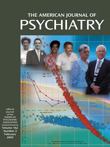To the Editor: I read with interest the recent excellent review on the risk of tardive dyskinesia with second-generation antipsychotic medications by Dr. Correll et al. However, for several reasons, the risk of tardive dyskinesia with certain second-generation antipsychotics may be higher than that reported in the original articles on which the review was based.
The use of 1 year as a minimum time period for inclusion of a study in the review was reasonable. However, tardive dyskinesia can occur for many years after treatment. Furthermore, many of these studies did not adequately assess acute-onset movement disorders—including parkinsonism, acute dystonia, and akathisia—that can increase the long-term risk of tardive dyskinesia. Of these, parkinsonism is particularly important for predicting the risk of tardive dyskinesia because it is associated with the masking of dyskinesia. Finally, in some of these studies, patients were treated with concomitant medications that can suppress dyskinesia.
For example, one study of risperidone and tardive dyskinesia
(1) reported that parkinsonism increased significantly with risperidone treatment. Therefore, the patients with parkinsonism may have been at an elevated risk for developing tardive dyskinesia in the future. Furthermore, the dropout rate for this study was relatively high—60%. When questioned
(2), the authors reported that some of the patients were excluded because of rigidity, but they did not report a percentage. The rigidity was probably due to parkinsonism. Therefore, it seems likely that patients at high risk of developing tardive dyskinesia were excluded from the study.
In another example, Csernansky et al.
(3) reported that patients in their study were permitted to take several sedative-hypnotic or anxiolytic agents that can suppress antipsychotic-induced movement disorders. Little information was provided regarding the extent of use of these agents. Furthermore, as in the study by Jeste et al.
(1), the study by Csernansky et al.
(3) also had a relatively high dropout rate for the risperidone group—60%. The authors described the reasons for premature discontinuation in general terms, such as “patient’s choice” or “adverse events,” but it would have been helpful to understand the specific reasons for withdrawal. For example, did the patients withdraw because of acute-onset movement disorders?
The methodological limitations discussed should be addressed in the design of future studies of tardive dyskinesia. Until then, caution should be taken in interpreting the results of the review.

